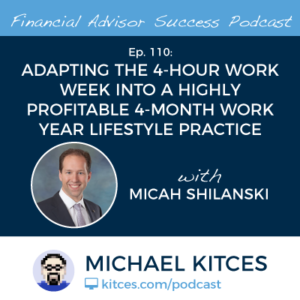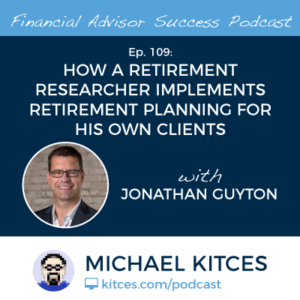 Welcome back to the 110th episode of Financial Advisor Success Podcast!
Welcome back to the 110th episode of Financial Advisor Success Podcast!
My guest on today's podcast is Micah Shilanski. Micah is a partner with Shilanski & Associates, an independent RIA in Anchorage, Alaska, where Micah personally oversees nearly $130 million of assets under management for almost 160 client households.
What's unique about Micah, though, is that over the past 8 years, he's transitioned from working 70-plus hour work weeks to refining his practice down to the point where he can service all 160 clients while being in the office for only 4 months of the year, an endeavor that he first started simply to get more efficient and better work/life balance, and then had to extend further out of necessity over the past several years to unfortunately support a sick child.
In this episode, we talk about how Micah manages his client workload of meeting processes to be able to sustain 160 clients while being in the office only 4 months of the year. How he boxed together a whopping six or seven client meetings a day for five-week surges in the spring and the fall, the way he handles meeting preparation and client notes in the midst of maintaining such an intensive client meeting schedule, how he sets a communication policy with clients during the onboarding process to set their expectations around his somewhat unusual schedule, and the way Micah overcame his own severe dyslexia to keep rigorous notes into CRM by using a combination of audio dictation tools and video emails to clients.
We also talk about how Micah has managed to not only maintain his practice but grow at 20% a year, despite only being in the office for 4 months, by focusing into a niche of helping federal employees with their retirement benefits. How he created his own niche website, plan-your-federal-retirement.com, to reach prospective clients, the seminar marketing strategy he uses to get even more clients into his niche, why he charges and can get a $500 initial consultation fee even for prospects that find him on the internet, and how by focusing into a niche, he's able to confidently charge above-average fees of $4,000 for an initial plan plus 1.75% of assets under management, because, as Micah emphasizes, there's nothing wrong with charging a premium fee when you genuinely offer specialized and premium service to a niche clientele who simply can't get the same expertise and experience anywhere else.
And be certain to listen to the end, where Micah shares the initial steps that any financial advisor can take to at least start to improve their own personal efficiency in the office, and how despite his time out of the office and the staff support he needs to make that happen, he's ultimately still been able to maintain his target of a nearly 70% EBOC take-home compensation from his $130 million AUM practice.

 Welcome back to the 108th episode of Financial Advisor Success Podcast!
Welcome back to the 108th episode of Financial Advisor Success Podcast! Welcome back to the 108th episode of Financial Advisor Success Podcast!
Welcome back to the 108th episode of Financial Advisor Success Podcast!
